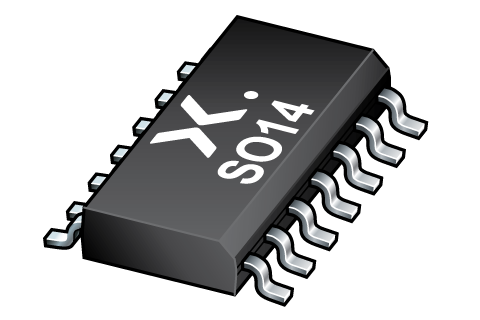可訂購部件
| 型號 | 可訂購的器件編號 | 訂購代碼(12NC) | 封裝 | 從經(jīng)銷商處購買 |
|---|---|---|---|---|
| 74LV164D-Q100 | 74LV164D-Q100J | 935300899118 | SOT108-1 | 訂單產(chǎn)品 |
進一步了解Nexperia的豐富產(chǎn)品組合,比如二極管、雙極性晶體管、ESD保護器件、MOSFET器件、氮化鎵場效應(yīng)晶體管(GaN FET)、絕緣柵雙極晶體管(IGBT)以及模擬IC和邏輯IC。我們的器件廣泛應(yīng)用于汽車、工業(yè)、移動和消費等多個領(lǐng)域,幾乎為世界上所有電子設(shè)計提供支持。
我們的產(chǎn)品在各行各業(yè)均有應(yīng)用,包括汽車、工業(yè)、電力、計算、消費、移動和可穿戴設(shè)備等行業(yè)。憑借對創(chuàng)新和可持續(xù)發(fā)展的不懈承諾,我們的器件成為了行業(yè)效率基準,可幫助全球客戶群體開發(fā)高效節(jié)能的前沿解決方案。

Register once, drag and drop ECAD models into your CAD tool and speed up your design.
Click here for more information8-bit serial-in/parallel-out shift register
The 74LV164-Q100 is an 8-bit edge-triggered shift register with serial data entry and an output from each of the eight stages. Data is entered serially through one of two inputs (DSA or DSB) and either input can be used as an active HIGH enable for data entry through the other input. Both inputs must be connected together or an unused input must be tied HIGH.
Data shifts one place to the right on each LOW-to-HIGH transition of the clock input (CP) and enters into Q0, which is the logical AND-function of the two data inputs (DSA and DSB) that existed one set-up time prior to the rising clock edge.
A LOW on the master reset input (MR) overrides all other inputs and clears the register asynchronously, forcing all outputs LOW.
This product has been qualified to the Automotive Electronics Council (AEC) standard Q100 (Grade 1) and is suitable for use in automotive applications.
Automotive product qualification in accordance with AEC-Q100 (Grade 1)
Specified from -40 °C to +85 °C and from -40 °C to +125 °C
Wide operating voltage: 1.0 V to 5.5 V
Optimized for low-voltage applications: 1.0 V to 3.6 V
Accepts TTL input levels between VCC = 2.7 V and VCC = 3.6 V
Typical VOLP (output ground bounce): < 0.8 V at VCC = 3.3 V and Tamb = 25 °C
Typical VOHV (output VOH undershoot): > 2 V at VCC = 3.3 V and Tamb = 25 °C
Gated serial data inputs
Asynchronous master reset
ESD protection:
HBM: ANSI/ESDA/JEDEC JS-001 class 2 exceeds 2000 V
CDM: ANSI/ESDA/JEDEC JS-002 class C3 exceeds 1000 V
DHVQFN package with Side-Wettable Flanks enabling Automatic Optical Inspection (AOI) of solder joints
| 型號 | VCC (V) | Logic switching levels | Output drive capability (mA) | tpd (ns) | fmax (MHz) | Power dissipation considerations | Tamb (°C) | Rth(j-a) (K/W) | Ψth(j-top) (K/W) | Rth(j-c) (K/W) | Package name |
|---|---|---|---|---|---|---|---|---|---|---|---|
| 74LV164D-Q100 | 1.0?-?5.5 | TTL | ± 12 | 12 | 78 | low | -40~125 | 90 | 7.9 | 47 | SO14 |
| Model Name | 描述 |
|---|---|
|
|
| 型號 | 可訂購的器件編號,(訂購碼(12NC)) | 狀態(tài) | 標示 | 封裝 | 外形圖 | 回流焊/波峰焊 | 包裝 |
|---|---|---|---|---|---|---|---|
| 74LV164D-Q100 | 74LV164D-Q100J (935300899118) |
Active | 74LV164D |

SO14 (SOT108-1) |
SOT108-1 |
SO-SOJ-REFLOW
SO-SOJ-WAVE WAVE_BG-BD-1 |
SOT108-1_118 |
| 型號 | 可訂購的器件編號 | 化學(xué)成分 | RoHS | RHF指示符 |
|---|---|---|---|---|
| 74LV164D-Q100 | 74LV164D-Q100J | 74LV164D-Q100 |
|
|
| 文件名稱 | 標題 | 類型 | 日期 |
|---|---|---|---|
| 74LV164_Q100 | 8-bit serial-in/parallel-out shift register | Data sheet | 2024-01-31 |
| AN90063 | Questions about package outline drawings | Application note | 2025-03-12 |
| SOT108-1 | 3D model for products with SOT108-1 package | Design support | 2020-01-22 |
| 74lv164 | 74LV164 IBIS model | IBIS model | 2017-10-21 |
| Nexperia_package_poster | Nexperia package poster | Leaflet | 2020-05-15 |
| SO14_SOT108-1_mk | plastic, small outline package; 14 leads; 1.27 mm pitch; 8.65 mm x 3.9 mm x 1.75 mm body | Marcom graphics | 2017-01-28 |
| SOT108-1 | plastic, small outline package; 14 leads; 1.27 mm pitch; 8.65 mm x 3.9 mm x 1.75 mm body | Package information | 2023-11-07 |
| SOT108-1_118 | SO14; Reel pack for SMD, 13"; Q1/T1 product orientation | Packing information | 2024-02-19 |
| 74LV164D-Q100_Nexperia_Product_Reliability | 74LV164D-Q100 Nexperia Product Reliability | Quality document | 2025-03-20 |
| SO-SOJ-REFLOW | Footprint for reflow soldering | Reflow soldering | 2009-10-08 |
| SO-SOJ-WAVE | Footprint for wave soldering | Wave soldering | 2009-10-08 |
| WAVE_BG-BD-1 | Wave soldering profile | Wave soldering | 2021-09-08 |
The Nexperia Longevity Program is aimed to provide our customers information from time to time about the expected time that our products can be ordered. The NLP is reviewed and updated regularly by our Executive Management Team. View our longevity program here.
| Model Name | 描述 |
|---|---|
|
|
| 型號 | Orderable part number | Ordering code (12NC) | 狀態(tài) | 包裝 | Packing Quantity | 在線購買 |
|---|---|---|---|---|---|---|
| 74LV164D-Q100 | 74LV164D-Q100J | 935300899118 | Active | SOT108-1_118 | 2,500 | 訂單產(chǎn)品 |
作為 Nexperia 的客戶,您可以通過我們的銷售機構(gòu)訂購樣品。
如果您沒有 Nexperia 的直接賬戶,我們的全球和地區(qū)分銷商網(wǎng)絡(luò)可為您提供 Nexperia 樣品支持。查看官方經(jīng)銷商列表。
The interactive datasheets are based on the Nexperia MOSFET precision electrothermal models. With our interactive datasheets you can simply specify your own conditions interactively. Start by changing the values of the conditions. You can do this by using the sliders in the condition fields. By dragging the sliders you will see how the MOSFET will perform at the new conditions set.